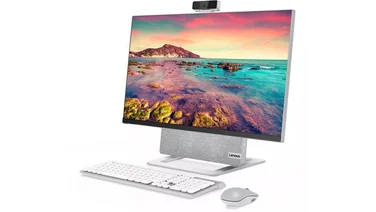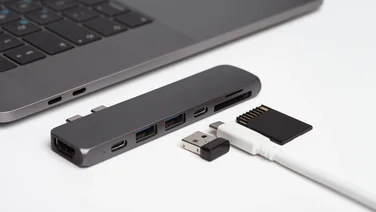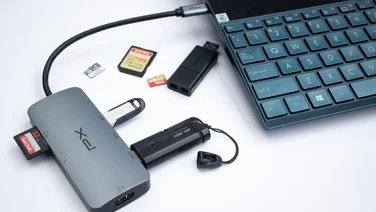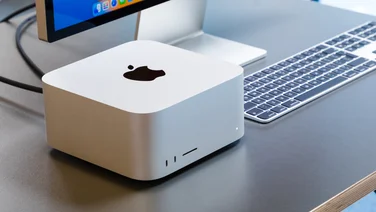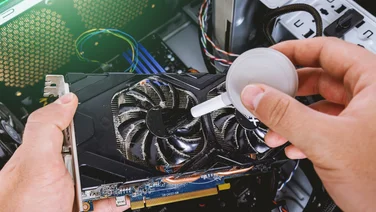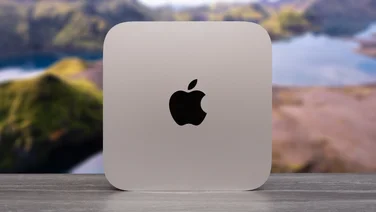To help us provide you with free impartial advice, we may earn a commission if you buy through links on our site. Learn more

- Extremely fast SSD
- Great gaming PC
- Avoids CPU bottlenecking
- Ugly chassis
- 3GB of VRAM will struggle with future game releases
It’s a shame that the Apollo S2 has the chassis it does – an unsightly, plasticky box that marries an over-designed front panel with such archaic design notes as the PSU being mounted in the roof instead of the base. It’s a shame because within this case is a seriously respectable assortment of mid-range components. Proof, not that it was necessary, that looks aren’t everything.
The CPU is the same hexa-core Ryzen 5 2600 that the Mesh Matrix Ryzen Pro uses, and the graphics card is an RX 570-beating GTX 1060 – the 3GB version, not a 6GB model as in the Overclockers Gaming Vision VR, but it’s a very capable card nonetheless.
There’s also 8GB of DDR4 RAM, our old friend the Asus Prime A320M-K motherboard, a gigantic 2TB hard disk and a 256GB NVMe SSD.
READ NEXT: These are the best gaming monitors you can buy right now
PC Specialist Apollo S2 review: Performance
This is easily the fastest SSD in this group test, racing to a 2,301MB/s read speed and a 1,239MB/s write speed: that’s nearly 650MB/s faster at reading data than the Palicomp AMD Abyss’s NVMe drive, not to mention multiples faster than any SATA-based drive. The GPU also makes this a great option for desktop gaming.
There’s nothing like the level of CPU bottlenecking that hamstrung the Gaming Vision VR, so the Apollo S2 actually pips it in Dirt: Showdown, landing 125fps at 1,920 x 1,080 and 91fps at 2,560 x 1,440 – both, to reiterate, with the highest possible quality settings.
In Metro: Last Light Redux, the more powerful 6GB GTX 1060 helped the Gaming Vision VR take the lead, but the Apollo S2 still did well. It produced 42fps at 1,920 x 1,080, which is fine, and although 2,560 x 1,440 proved too trying – it averaged 27fps – it doesn’t take a lot to get this up and running more smoothly. High settings, instead of Very High, and disabled SSAA pushed it all the way up to 70fps – an enormous performance improvement with only a minor drop in visual quality.
PC Specialist Apollo S2 review: Specifications
One potential concern is that the Apollo S2’s 3GB of VRAM might see it struggle with future game releases, as developers are increasingly taking advantage of 8GB and even 11GB GPUs to produce ever more taxing games. In our current tests, however, it’s worth noting that the 3GB GTX 1060 beat the 8GB RX 570 used by the AMD Abyss and Cyberpower Ultra 5 RX, so for the time being, it’s enough.

This system also reached a commendable score of 7.4 out of 11 in the SteamVR Performance Test. Processing power is good, although, like its gaming performance, not among the very best. With its Ryzen 5 2600, which runs at a 3.4GHz base clock with the ability to boost up to 3.9GHz, the Apollo S2 scored 137 in our image test, 212 in the video test, 247 in the multitasking test and 247 overall. That means it’s roughly equal with the Ryzen 5 2600X on single-core power, which is great news for basic tasks, but when it comes to heavily multithreaded software, the AMD Abyss and Chillblast Fusion Recoil have the advantage.
Even the Mesh Matrix Ryzen Pro, which has the exact same processor, was able to get higher scores of 220 in the video test and 261 in the multitasking test, by way of having twice as much RAM as the Apollo S2. All that said, it’s not as if this is a slow PC; it will be an awful lot quicker, particularly for multithreading, than the likes of the Gaming Vision VR, the Acer Nitro N50-600 and the Ultra 5 RX.
READ NEXT: Here are some of the best gaming keyboards currently available
PC Specialist Apollo S2 review: Features
You should quite easily be able to run photo or video-editing suites without much worry. One thing this and the Ultra 5 RX have in common (as well as the Fusion Recoil) is the motherboard, which means an identical set of connections on the rear I/O panel: two USB 2 ports, four USB 3 ports, two PS/2 connectors, an Ethernet jack, and line out, mic and headphone 3.5mm jacks.
Even the display outputs are the same: one HDMI port, three DisplayPort connectors and a DVI-D port. The essentials are all covered, even if the AMD Abyss offers more variety and faster USB 3.1 ports. The lack of storage space could be an issue. It’s a good thing it already comes with a large hard disk, because with just one 2.5in slot and two 3.5in slots going spare, this isn’t the most upgrade-friendly chassis.

There are two 5.25in slots, but then the microATX motherboard is completely devoid of unused slots if you don’t count the PCI-E x1 slot that’s covered up by the graphics card. In fairness, the other slot is occupied by an 802.11n Wi-Fi card, so unless you want to add sound, you might not even need them. Wireless connectivity is, as always, a nice little bonus, and the only setup required is screwing on the two bundled antennas at the back of the PC.
PC Specialist Apollo S2 review: Verdict
The Apollo S2 is a great gaming PC. Like the Gaming Vision VR, it has a potent mid-range graphics card that can handle both 1080p and even 1440p, and avoids any CPU bottlenecking nastiness while also having a spacious hard disk to store your library of games. As such, it’s worth a Recommended award, although the AMD Abyss is better overall: it’s only a little less capable in gaming, and is superior in most other respects.
